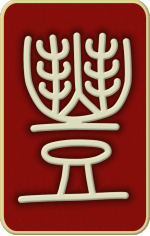
丰 Fēng Abundance (Plenty) [hexagram 55]


Thunder over Fire
 Wood element
Wood element
Lunar month: 6 ; Host (controlling) line : 5
The Decision
Abundance indicates progress and fulfillment. The leader seeks to attain this; no worries – like the sun at midday.
Abundance signifies greatness, consisting of shrewdness and action. ‘The leader seeks to attain this’ – but there is still further to go. ‘No worries – like the sun at midday’ – illuminating all under heaven. At midday the sun reaches its height and begins to descend. When the moon is full it begins to wane. Heaven and Earth wax and wane in due season. This must also apply even more aptly for people and to the unseen.
丰: 亨, 王假之, 勿忧, 宜日中. Fēng: hēng, wáng jiǎ zhī, wù yōu, yí rì zhōng.
彖传: 丰, 大也. 明以动, 故丰. 王假之, 尚大也. 勿忧宜日中, 宜照天下也. 日中则昃, 月盈则食, 天地盈虚, 与时消息, 而况人于人乎?况于鬼神乎? Tuàn zhuàn: Fēng, dà yě. Míng yǐ dòng, gù fēng. Wáng jiǎ zhī, shàng dà yě. Wù yōu yí rì zhōng, yí zhào tiān xià yě. Rì zhōng zé zè, yuè yíng zé shí, tiān dì yíng xū, yǔ shí xiāo xi, ér kuàng rén yú rén hū? Kuàng yú guǐ shén hū?
The Image
Thunder and lightning combine to form ‘Abundance’. The wise accordingly administer justice and determine punishments.
象传: 雷电皆至, 丰; 君子以折狱致刑. Xiàng zhuàn: Léi diàn jiē zhì, fēng; jūn zǐ yǐ zhé yù zhì xíng.
Line Change 1
Encountering an ambitious colleague. Remaining together for a week – no blame. Continuation has merit.
‘Remaining together for a week – no blame’ – to exceed this time spells misfortune.
初九: 遇其配主, 虽旬无咎, 往有尚. Chū jiǔ: yù qí pèi zhǔ, suī xún wú jiù, wǎng yǒu shàng.
象传: 虽旬无咎, 过旬灾也. Xiàng zhuàn: Suī xún wú jiù, guò xún zāi yě.
Line Change 2
The curtain is so thick and large that the pole stars can be seen at noon. Continuation brings mistrust and hate. If devoted and true, this will inspire and there is good fortune.
‘If devoted and true this will inspire’ – it is by sincerity that things get done.
六二: 丰其蔀, 日中见斗, 往得疑疾, 有孚发若, 吉. Liù èr: fēng qí bù, rì zhōng jiàn dǒu, wǎng dé yí jí, yǒu fú fā ruò, jí.
象传: 有孚发若, 信以发志也. Xiàng zhuàn: Yǒu fú fā ruò, xìn yǐ fā zhì yě.
Line Change 3
The curtain is so thick that at midday small stars can be seen. Right arm is broken but no fault.
‘The curtain is so thick’ – inappropriate to attempt important tasks. ‘Right arm is broken’ – eventually unable to work.
九三: 丰其沛, 日中见沬, 折其右肱, 无咎. Jiǔ sān: fēng qí pèi, rì zhōng jiàn mèi, shé qí yòu gōng, wú jiù.
象传: 丰其沛, 不可大事也. 折其右肱, 终不可用也. Xiàng zhuàn: Fēng qí pèi, bù kě dà shì yě. shé qí yòu gōng, zhōng bù kě yòng yě.
Line Change 4
The curtain so thick that at midday the pole stars can be seen. Meeting the leader who shares the same mind – well-timed.
‘The curtain so large and thick’ – an inappropriate position. ‘At midday the pole stars can be seen’ – all gloom and no light. ‘Meeting the leader who shares the same mind – well-timed’ – an opportunity for action.
九四: 丰其蔀, 日中见斗, 遇其夷主, 吉. Jiǔ sì: fēng qí bù, rì zhōng jiàn dǒu, yù qí yí zhǔ, jí.
象传: 丰其蔀, 位不当也. 日中见斗, 幽不明也. 遇其夷主, 吉; 行也. Xiàng zhuàn: Fēng qí bù, wèi bù dàng yě. rì zhōng jiàn dǒu, yōu bù míng yě. yù qí yí zhǔ, jí; xíng yě.
Line Change 5
Clever people surround. Praise and congratulation. Good fortune.
The fifth ‘six’ gives rise to praise and congratulation.
六五: 来章, 有庆誉, 吉. Liù wǔ: lái zhāng, yǒu qìng yù, jí.
象传: 六五之吉, 有庆也. Xiàng zhuàn: Liù wǔ zhī jí, yǒu qìng yě.
Line Change 6
House in state of abundance, screened from the family but looking at the gate there is no-one around. For three years no one is seen. Misfortune.
‘House in state of abundance’ – pride soars heavenward. ‘Looking at the gate there is no-one around’ – withdrawn from others.
上六: 丰其屋, 蔀其家, 窥其户, 阒其无人, 三岁不觌, 凶. Shàng liù: fēng qí wū, bù qí jiā, kuī qí hù, qù qí wú rén, sān suì bù dí, xiōng.
象传: 丰其屋, 天际翔也. 窥其户, 阒其无人, 自藏也. Xiàng zhuàn: Fēng qí wū, tiān jì xiáng yě. Kuī qí hù, qù qí wú rén, zì cáng yě.
The full set of 64 English translations is available in our new book 'Book of Changes - Deciphered' ➚.